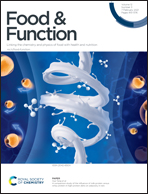Toward improved human health: efficacy of dietary selenium on immunity at the cellular level
Abstract
Selenium, an essential trace element in the body, participates in various biological processes in the form of selenoproteins. In humans, a suitable concentration of selenium is essential for maintaining normal cellular function. Decreased levels of selenoproteins can lead to obstruction of the normal physiological functions of tissues and cells and even death. In addition, the level of selenium in the body affects cellular immunity, humoral immunity, and the balance between type 2 and type 1 helper T cells. Selenium can affect the immune function of the body through the reactive oxygen species (ROS), NF-κB, ferroptosis and NRF2 pathways. This paper reviews the immune effect of selenium on the body and the process of signal transduction and aims to serve as a reference for follow-up studies of immune function and research on the development of new selenium compounds and active targets.



 Please wait while we load your content...
Please wait while we load your content...